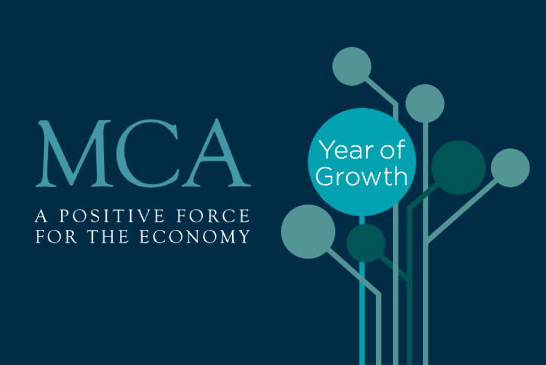On one level, it’s very easy to justify a year-long MCA campaign on growth. Consulting firms are businesses just like other parts of the economy. They are equally concerned about the health, buoyancy and sustainability of the UK’s markets. And growth obviously matters to individual consultants just as much as to other citizens.
But because growth interests everyone, it's a crowded discussion. What’s special about consultants’ perspectives? After all, if we are going to have a Year of Growth, we will need to say some interesting things.
Essentially, there are two linked reasons for deciding on this topic.
The first is that consulting is growing strongly. In 2013 it grew at 8%, in 2014 at 8.4%. This growth is faster than trend growth in the wider economy and faster than in most sectors. So, consultants must be doing something right, and understanding their success could be beneficial to others.
The second reason is what they are doing right.
Consultants want to grow, like other businesses. But those other businesses are consulting’s clients and potential clients. So consultants have to serve their interests to survive. And the current preoccupation among those clients, together with linked issues such as Digital, is growth itself.
In the aftermath of the financial crisis, businesses needed to downsize and restructure. The financial services sector also faced the challenge of complying with new regulations and introducing more effective systems to understand and monitor risk. Consultants assisted with both cost cutting and regulatory compliance. Unglamorous but essential work.
Now, as successive surveys of consulting activity conducted for our most recent Annual and End of Year Reports reveal, the bulk of consulting work carried out by MCA member firms is about supporting business growth. This takes two broad forms: getting firms ‘match fit’ for growth and supporting them with specific growth propositions.
Consulting is growing by helping others grow.
So, the aim of the Year of Growth will be to use events, discussions and research to extract some of the core insight from this growth-supporting consulting activity and to translate it into valuable thought-leadership. Some of the intellectual raw material will come from consultants’ specific service-line activities, such as support for firms needing to digitise in order to compete. Some will derive from their activity in areas such as infrastructure and transport, where they are central to fashioning the networks on which future growth is predicated. Other outputs in the course of the Year will link sectorial activities to themes. For example, we will explore what consultants believe is needed to 'rebalance' the economy based on their work in manufacturing. Consultants will also have valuable intelligence on the skills needs of particular industries.
One important observation that will inform our work is that growth is challenging. This is in part about ensuring growth is sustainable, that we have the right skills (and access to them through an open economy) and that we operate in the right markets. We will examine these topics over the Year. But it is also about the ‘anxious’ nature of UK growth.
As growth returns in the Digital Age, firms, especially in digitally exposed sectors such as retail, often feel that have to invest heavily in Digital capabilities just to keep up with the competition. With retail also being heavily discounted, much of the activity has a ‘grow to stand still’ character. Many other sectors face Digital disruption. Witness the impact of Uber on travel or Nest on domestic energy. Digital has shortened the business cycle, reduced barriers to entry, rubbed out boundaries between markets and shifted power towards consumers. As the fates of Kodak, Woolworth and high street music stores show, no one is safe.
Growth is accordingly difficult. In this ‘anxious growth’ context, consultants are well positioned to understand the components of success. It is critical that we identify them. For while restlessness is plainly a feature of the new normal, the implications of this for business organisation, strategy, human resources and investment are, as yet, imperfectly understood. It may not be possible to keep growth, at either the micro level of the enterprise or the macro level of the economy, on an especially predictable footing in the future. But understanding the components and principles of success should at least help distinguish between the energetic and protean pursuit of business expansion and advantage on the one hand and the manic expenditure of effort for the sake of it on the other.
One thing that threatens to undermine the UK’s progress towards a sustainable recovery is our poor record on productivity. Improvements in infrastructure, better investment in training and targeted R&D are often cited as the routes to better levels of unit output per input. But the issue of productivity, especially in service sectors and in the context of Digital, is becoming increasingly complex. Amazon’s business model seems to depend on size, rather than profit. It can invest in approaches which then become norms consumers demand. Suppose Amazon introduced free same-day delivery on all consumer goods. How could a specialist retailer make the necessary investments to compete without becoming, at least for a time, simultaneously unprofitable and, against some measures, unproductive – even as it rose to the challenge of meeting consumer expectations? Indeed, are certain consumer demands even consistent with traditional models of productivity? People like using Ocado for the ease and enjoyability of the model. Is that the same as the Ocado approach being a model of productivity?
In the course of the Year of Growth, MCA member firms will work with partners from industry, academia and government. We will explore important questions: the new business normal for growth, skills needs, and the productivity challenge. By the end of the year, we should have a body of insight on the UK’s growth and recovery potential that is worthy of serious attention from business leaders and policy-makers.

